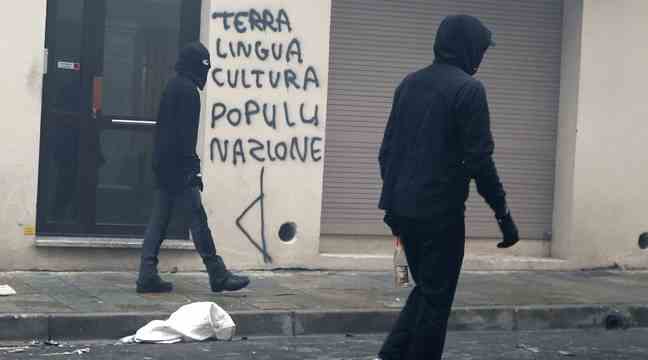Have the two weeks of demonstrations in Corsica made it possible to speed up the work on the status of the Island of Beauty and the prospect of possible autonomy, as elected officials have been demanding for several years? In any case, this is the direction taken by the discussions between the Corsican elected officials and the Minister of the Interior, Gérald Darmanin, who arrived this Wednesday noon in Ajaccio. Even before his arrival, the minister took the lead in an interview with Corsica Morning, declaring that the government was “ready to go as far as autonomy” in Corsica. But the island already having a special status, the contours of a possible reform must still be specified.
Decentralization versus autonomy
If Corsica is not yet autonomous, its organization does not quite resemble that of other French regions. Since January 1, 2018, and under the NOTRe Act of 2015, the Isle of Beauty has become a “community with special status” – and no longer a region made up of two departments –, called “collectivity of Corsica”. An entity composed of the Assembly of Corsica (legislative power) and the Executive Council, whose autonomist president, Gilles Simeoni, leads discussions with the government. And if Gérald Darmanin used the word “autonomy”, it’s not for nothing. Because this status is very different from independence, which would suppose that Corsica no longer has any link with Paris.
In the autonomy project led by Gilles Simeoni, “sovereign powers” – that is to say the police, justice, defense and currency – would remain “in the domain of the State”, while certain powers would be transferred “as of right to the community of Corsica, which will exercise real normative power, of a legislative nature”, he detailed on France Info this Wednesday morning, citing “taxation”, “the policy of combating land speculation” or even “certain economic development policies”. For Thierry Dominici, political scientist and professor of political science at the University of Bordeaux, it is more about decentralization than real autonomy: “We can talk about administrative autonomy, that is to say giving more competences to local institutions”.
The example of French Polynesia
According to Jean-Christophe Angelini, mayor of Porto-Vecchio and president of the Avanzemu group in the Assembly of Corsica, “autonomy is first of all to act on the levers of everyday life”, he explains, believing that the economy, taxation, health and education are priority subjects. And the elected official cites several examples, in particular public health budgets: “They are allocated by region according to a geographical coefficient. Corsica is small, but it has specificities. It is a mountainous island, with particular difficulties in accessing healthcare. Autonomy would circumvent this coefficient and allocate a budget that is consistent with the reality of the territory. Another example is that of taxation and the economy. The elected official pleads for the territorialisation of certain taxes, such as that on companies or VAT. “Corporate tax in Corsica is just over 1 billion euros per year, equivalent to the budget of the Corsica community. By establishing autonomy, part of the money would remain in our coffers. We want the flows generated by our economy to remain, in part, on the island,” adds Jean-Christophe Angelini.
If the Corsican elected officials already seem to have drawn the outlines of a possible statute of autonomy, it will be up to the State to decide. According to several specialists, the new status could resemble that of French Polynesia, as Gérald Darmanin notably suggested: “It could be autonomy within our current Constitution. French Polynesia has a status of autonomy which obviously allows it to be totally in the Republic and to have a particular specificity, in particular for all that is economic and social”, declared Gérald Darmanin to our colleagues from Corse-Morning. “The statute of Polynesia gives an application status to elected officials, that is to say the freedom to apply national law on the island”, details Thierry Dominici.
Towards a revision of the constitution?
But this is where it gets complicated. Polynesia – along with Saint-Pierre-et-Miquelon, Wallis-et-Futuna, Saint-Barthélemy and Saint-Martin – falls under Article 74 of the Constitution, which details the status of overseas communities. However, “Corsica is not an overseas collectivity. Except by revising it, it seems difficult to me to attach Corsica to this article”, deciphers Michel Lascombe, associate professor in public law and specialist in constitutional law. The other solution, according to the specialist, is to create, “as provided for in article 72 of the Constitution, a community with a special status”. “This is already the case for Corsica, so that means that this particular status should be modified”, adds the professor, who nevertheless considers “that a special status is not really autonomy”.
For Christophe Mondou, lecturer in local authority law, public law and administrative law, Corsica could count on the so-called “3DS” law (for “differentiation, decentralization, deconcentration and simplification”), just adopted last February: “This law makes it possible to modify the attribution of competences in a category of communities. It means that we can go further, ”analyzes the teacher.
Because the question drags on. Already in 2017, Emmanuel Macron had promised to create a “tailor-made” article for Corsica in the Constitution. But the reform of the institutions, which was to ratify the special status of the Island of Beauty, had been postponed because of the Benalla affair. “But Emmanuel Macron’s proposal, which wanted to give Corsica the same powers as the overseas departments, did not satisfy the nationalists”, recalls André Fazi, political scientist and lecturer in political science at the University of Corsica. “Autonomy is always relative. In Polynesia, the spectrum of skills is much broader than that of Saint-Martin and Saint Barthélemy”, underlines the specialist. “The next question is therefore: ‘What degree of autonomy are we talking about?’ »

